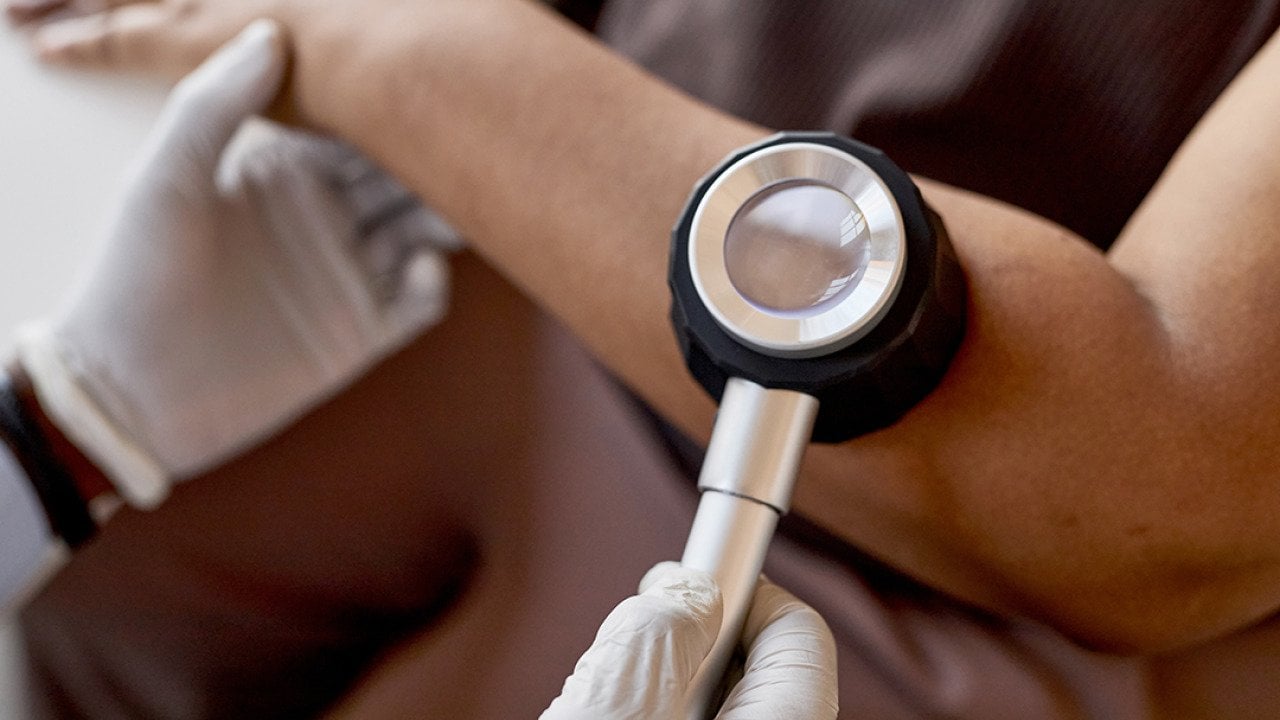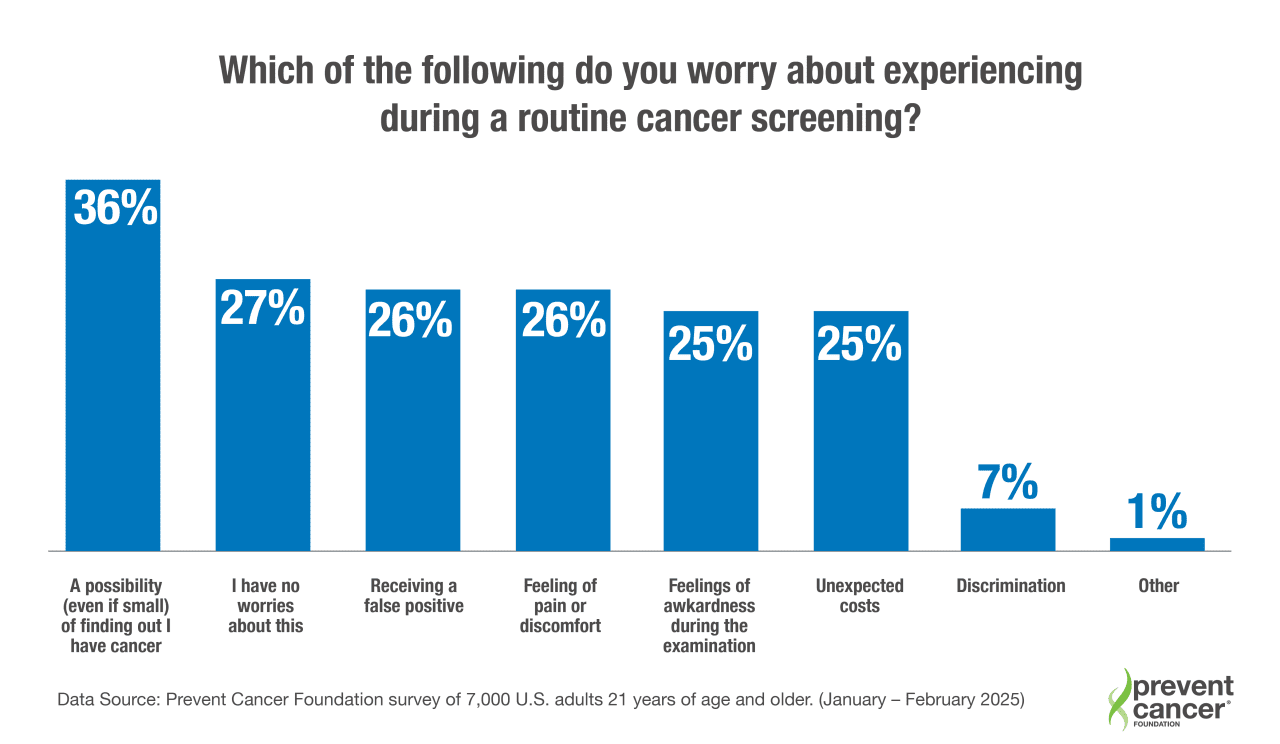Fear is keeping people from cancer screenings — and that could cost lives

SeventyFour // Shutterstock
Fear is keeping people from cancer screenings — and that could cost lives
For decades, public health experts have known that catching cancer early can mean the difference between life and death. Early detection greatly improves the chances of successful treatment and better outcomes for many types of cancer.
Yet despite advances in screening and treatment options, too many Americans are skipping routine cancer screenings — 69% are behind on at least one routine cancer screening. The Prevent Cancer Foundation’s new data suggest fear is a leading culprit.
According to the Foundation’s 2025 Early Detection Survey, nearly three-quarters of U.S. adults (73%) worry when they think about cancer screenings. That worry translates into avoidance: Those with concerns are more likely to be behind on one or more screenings. The consequence is that cancers are more likely to be discovered at later, harder-to-treat stages.
Fear eclipses facts
The survey, conducted by Atomik Research with a nationally representative sample of 7,000 adults, reveals the complex ways worry undermines preventive care. More than one in three respondents (36%) said they feared the possibility of finding out they had cancer, and among that group, 39% believed a diagnosis was “usually a death sentence.”
That belief does not match reality. Thanks to broader access to screening and improved therapies, survival outcomes for many cancers have dramatically improved in recent decades. But outdated perceptions linger — and misinformation carries real consequences.
Beyond fear of the diagnosis itself, people cited anxiety about the screening process. About one in four worried about pain or discomfort, false positives, costs, or even the awkwardness of the exam.
For women, these concerns are especially pronounced. Nearly 30% of women who were behind on routine screenings said they worried about pain during the exam, while 38% worried about discovering cancer.
These anxieties add up to missed appointments. One in six women reported they missed or may have missed a routine cancer screening in the past year, citing they were often better about keeping up with mundane tasks like renewing a driver’s license or getting a haircut.

Prevent Cancer Foundation
A shift in trust
While fear plays a powerful role, trust in the health care system is also fraying. The survey found that one in seven U.S. adults behind on screenings cited skepticism of the system as a reason.
Among minority populations, concerns about discrimination are particularly acute: 14% of adults who identify as mixed race, “some other race,” or LGBTQ+ said they worry about discrimination in the health care setting, as did 13% of Black or African American respondents.
These findings underscore the importance of building a more inclusive health care environment. When patients believe they will be treated with respect and compassion, they are more likely to follow through with recommended care.
When knowledge changes behavior
Despite these barriers, the survey also points to hope. Education appears to be a potent antidote to fear. 73% of adults said they would be more likely to schedule a screening after learning about the benefits of early detection.
And 36% said access to information about advances in cancer treatment would motivate them to keep up with screenings.
That is why it is essential to communicate clearly: A cancer diagnosis does not always mean a death sentence, and the earlier a cancer is found, the better the odds of successful treatment. Knowledge is power, and when it comes to early detection, it also may translate to time.
When people understand the lifesaving benefits of early detection, they are more likely to take action. By breaking down fear with facts and empowering people to check their health, improved outcomes result.
Women and screenings beyond “women’s cancers”
Another insight from the survey is that awareness is uneven across cancer types. Women report being most familiar and most likely to get breast cancer screenings as recommended compared to other cancers — 65% of eligible women are up to date.
But that drops sharply for other cancers. Only 54% of women said they were up to date on colorectal screenings, 43% on dental oral cancer exams and 37% on skin cancer checks.
This gap matters because several cancers — not just breast or cervical — can be detected early with screenings. Routine cancer screenings and checks are critical for better health outcomes.
What gets in the way — and what could help
The survey also offers clues about practical changes that could bring more people into care. Among respondents behind on screenings, 64% said they would be more likely to participate if innovative options were available — such as at-home kits, faster or less invasive tests, or screenings that could be done less often.
Other strategies include:
- Reducing cost: Nearly one-third of adults said they would be more likely to prioritize their screenings if the cost was more affordable.
- Reminders: Sixty-one percent said they would be more likely to stay on track if they received reminders by text, phone or email.
- Patient navigation: More than half (51%) said having a provider help them navigate the system would make a difference.
These findings highlight that fear is not the only barrier. Structural challenges — cost, convenience, and access — are equally pressing. Addressing both the emotional and logistical obstacles will be critical if the nation hopes to reverse the downward trend in routine care.
This story was produced by Prevent Cancer Foundation and reviewed and distributed by Stacker.
![]()



